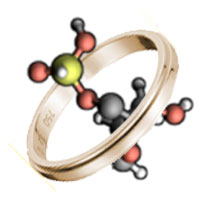You might be miserable,
but your genes aren’t
 We’ve all heard the clichés countless times, many of us from our own lips. “Life’s a bitch, and then you marry one.” “I always fall for men who are no good for me.” And so on.
We’ve all heard the clichés countless times, many of us from our own lips. “Life’s a bitch, and then you marry one.” “I always fall for men who are no good for me.” And so on.
If you found your soul mate the first time around my hearty congratulations. You can count yourself amongst the very lucky few. For when I look at the relationships of those around me, those of my friends, family and colleagues, they smack rather more of Stockholm Syndrome than wedded bliss.
A marriage of inconvenient convenience
For many years I dismissed this pattern as simply down to lazy mate selection. You can’t, after all, evaluate every one of the couple of billion potential partners out there to find the closest mutual fit. Life is way too short. And when you reach the normal “settling down” age for your society, when your friends are starting to queue at the altar (marital or sacrificial, take your pick) there’s peer pressure to make your choice and fear of losing out.
You settle.
Far from seriously evaluating a couple of billion possible matches, the average person probably goes no further than a couple. Or if you belong to a culture where arranged marriage is the norm, not even that.
I also chalked it up to dishonesty. With arguably benign intentions, people lie in relationships. So often in the early days I see the pattern of the hunter and the hunted. One partner will be true to themselves, the other will do all the running, making whatever changes they need to make in order to accommodate that other person in their life. But you can’t live a lie indefinitely; eventually the hunter reverts to type and the conflicts start.
So, it’s all down to facile choices amongst disingenuous people then?
Is it?
Sweeter the second time around
I’m approaching middle age now (some say I was born that way). So too are my contemporaries, many of whom have moved on from their tempestuous first marriages and seem to have found safe harbour the second time around. I can’t think of many who have been back to the market and not come away better suited.
But they haven’t spent more time looking the second time around; they haven’t tried significantly more partners. If it were simply the number of partners they had evaluated, and we trivially treat the second marriage as doubling the number of partners they’ve had in their lives, then maybe we’d expect half to come away happier rather than most of them. So why has their mate selection improved by so much?
Maybe we’re just more honest with ourselves and about ourselves the second time around? After all, with age comes increasing self awareness and self knowledge. We understand ourselves better and we learn from our past mistakes.
Or perhaps we just become easier to live with? How many moody and difficult twentysomethings and thirtysomethings have you met in your life who have gone on to become safe, settled and dull fortysomethings or fiftysomethings? Second marriages may be less tempestuous than first marriages because we ourselves become less tempestuous.
Maybe baby
Or perhaps what we look for in a second marriage is different to what we look for in a first marriage. Or more specifically the bit of us doing the looking is different.
Why do we select that first “mate” after all? To “mate” with of course. And why the hell would our DNA let our happiness get in the way of finding the best available DNA to combine with?
So much of what we do is driven by our instincts, by our evolution and by our DNA. It makes perfect sense that an instinct to select the best possible “quality” of mate, regardless of how happy we would be living with them, would become a dominant one.
And perhaps this is why marriage seems sweeter the second time around. Because your first partner is chosen by your genes, your first marriage is about your kids. Your second partner is selected by your brain, your second marriage is about you.